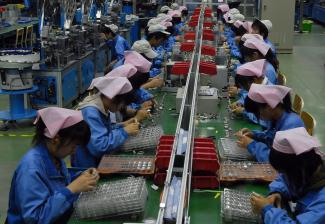Trade union
No Revolution

Headlines about suicides of staff members, outrageous labour conditions and strikes have made Foxconn a household name around the world in the recent years. Surprised consumers learned that many much-craved electronics items such as smartphones and tablet computers are all manufactured by this previously hardly known industrial giant – and even almost regardless of the respective brand name.
Foxconn is from Taiwan and only did in the People’s Republic what many foreign investors do. The company takes advantage of the comparatively low production costs which result from huge bulk orders, comparatively low wages, very disciplined production lines and hardly any co-determination by the staff. Typically, companies such as Apple, HP and Samsung only provide blueprints for production, but do not manufacture their goods anymore. Whether the goods are telephones, computers or clothing, however, the brand-name companies tend to reap in the highest profits.
In February, Foxconn made the headlines of western newspapers once more. They wrote that Foxconn was planning to introduce independent shop councils in China. At the same time, it was pointed out that Foxconn might only be taking a PR advantage of regularly scheduled elections for China’s official trade unions. State media in the People’s Republic stated that existing institutions would be improved, but no radical innovation was planned.
To make sense of such news one must understand China’s trade union system. The All-China Federation of Trade Unions (ACFTU) is the umbrella organisation of all trade unions at the regional and company levels. These unions are not autonomous organisations of the workforce, but rather are under the control of the Communist Party, just like ACFTU itself. As in other socialist countries in the past, ACFTU long served a completely different function than trade unions do in capitalist economies. ACFTU was more like a government agency promoting social welfare than an independent agency acting on behalf of companies’ staff. Today, China is socialist only in name. Society has become marked by the business interests of private and public sector companies. As the economy was liberalised and foreign investors came to the country in the 1990s, the share of companies with union representation declined. In the past ten years, however, the government has once more been promoting unionisation under the ACFTU umbrella, including in foreign-owned factories.
The unions play an ambivalent role. They are supposed to make workers tow the party line and help managers to keep production going smoothly. At the same time, they are supposed to represent workers’ interests effectively enough to prevent major labour disputes.
Foxconn introduced a company union in 2008. To date, it has basically been a management puppet. The managers appoint the delegates, and apparently there are only very few real workers among them. That will change somewhat. In future, the union is meant to become more representative of workers’ views. There will not be a free election, however.
What is on the cards is not a revolution, but incremental progress – und such progress fits the PR needs of both the Chinese government and the major brand-name multinationals, on the behalf of which Foxconn operates. All involved are certainly interested in channelling workers’ discontent moreover. In the eyes of the government, boosting workers’ rights within the companies is preferable to uncontrolled strikes or, even worse, the illegal founding of autonomous unions.
Consumers will not be let off the hook, however. So far, their demand for electronic devices has been booming regardless of Foxconn’s harsh labour conditions. Unless that changes, stronger workers’ rights in China are unlikely to achieve much else than making production shift to other developing countries soon.
Doris Fischer is professor for “China business and commerce” at Würzburg University.
doris.fischer@uni-wuerzburg.de







